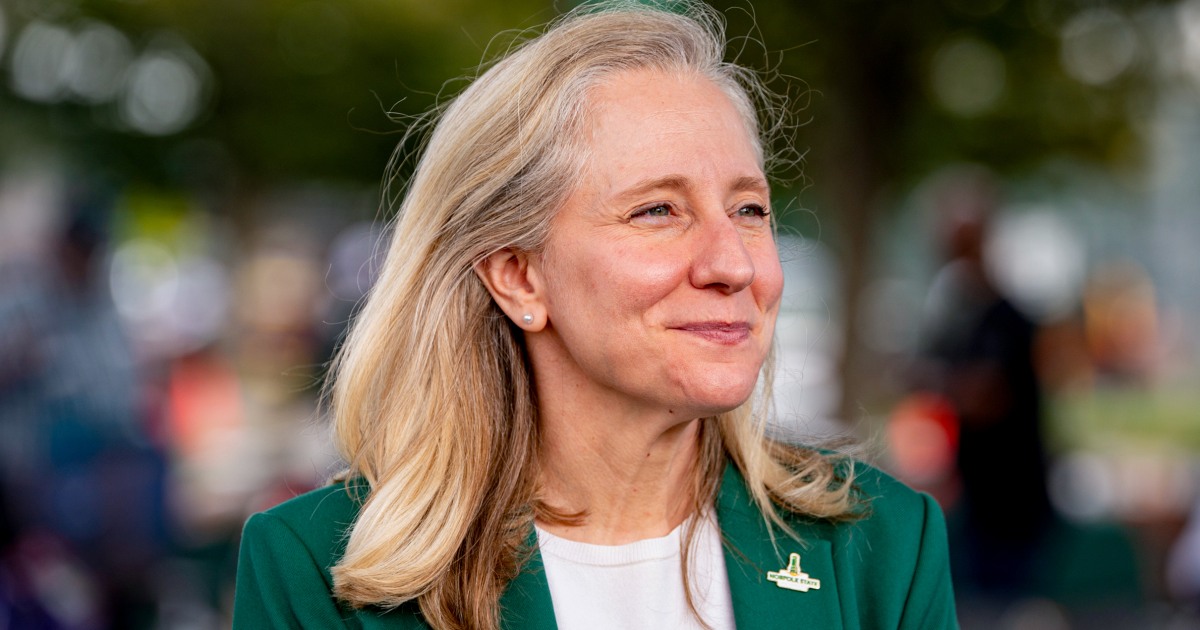Democrat Abigail Spanberger has defeated Republican Winsome Earle-Sears to flip control of the Virginia governorship, NBC News projects, setting her up to become the first woman to lead the state.
Spanberger, a former congresswoman, won the race in the blue-leaning state after holding polling and fundraising advantages throughout the campaign. Her victory provides Democrats with a shot of momentum as the party attempts to chart their path forward after their 2024 election defeat.
Virginia was one of two states, along with New Jersey, that held the first governor’s races of President Donald Trump’s second term.
Spanberger, 47, centered her campaign heavily on economic and affordability issues, as well public safety and her support for abortion rights. Spanberger’s campaign and allied groups attacked Earle-Sears over her conservative record on social issues and her fealty to Trump.
Earle-Sears, 61, struggled throughout much of the race to find a coherent message. She attempted to emphasize the accomplishments of GOP Gov. Glenn Youngkin’s administration, telling voters that electing her would mark a continuation of his record, including growing the private sector of the economy and standing up for “parents’ rights” in schools. In the race’s final weeks, she crafted a “commonsense” theme that seemed intended to mimic parts of Youngkin’s winning formula in 2021.
Earle-Sears also frequently praised Trump and his policies on the campaign trail, even though the president never even offered a formal endorsement. Trump held a tele-rally for Virginia’s Republican candidates on Monday night but never mentioned Earle-Sears by name.
Spanberger, a former CIA officer, flipped a Republican-held House seat in 2018 and established herself as a more moderate Democrat, an image she cultivated during her campaign for governor.
She attracted a crowd of big-name Democrats — and potential 2028 presidential candidates — to campaign with and for her in the state, helping to punctuate her anti-Trump message in the closing days of the race.
While Spanberger held key advantages, she was also forced to navigate a series of issues that threatened to upend the final stretch of the race.
Those included the federal government shutdown that began on Oct. 1, the emergence of violent text messages sent by Jay Jones, the Democratic attorney general nominee sharing the ballot with Spanberger, and a last-minute redistricting effort by Virginia Democratic lawmakers.
Spanberger this year had seized on the move by Trump’s Department of Government Efficiency to shrink the federal workforce. And when the shutdown kicked off, she leaned into blaming Trump and Earle-Sears, arguing that it was just the latest product of the chaos of a GOP-controlled Washington that has hurt Virginia, home to a large number of federal employees.
Jones’ texts proved a more difficult situation for her campaign. In those texts from 2022, Jones suggested that one of the top legislative Republicans in the state be shot in the head, triggering bipartisan condemnation and calls from Republicans for Jones to exit the race.
Spanberger immediately condemned the texts but never called on Jones to drop out, and repeatedly declined to say whether she would retract her endorsement of him.
Republicans up and down the ballot in Virginia began running ads centered on the texts, including several spots from Earle-Sears that prominently featured Spanberger’s silence on the issue during the lone debate in the campaign.
Spanberger also faced relentless attacks from Earle-Sears over her stances on transgender people’s participation in youth sports and use of school locker rooms and public bathrooms — a reprise of the GOP’s playbook from the 2024 presidential race.
Spanberger typically responded throughout the campaign by saying she felt it was important that such decisions be made by parents, teachers and administrators, not the governor — a reply that largely avoided the emerging debate within the Democratic Party on the issue.
And while an effort launched by Virginia Democratic lawmakers one week before the election to redraw congressional maps to boost their party ahead of next year’s midterm elections added an unexpected wrinkle to the race, it didn’t appear to fundamentally alter it. Earle-Sears, who as lieutenant governor must preside over the state Senate, was called back to Richmond for some of the closing days of the campaign.
Headwinds had also historically favored Spanberger: In 11 of the last 12 Virginia gubernatorial races, voters elected the candidate of the party out of power in the White House.

